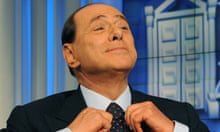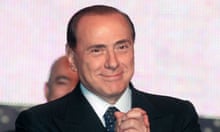For better or worse, Silvio Berlusconi held a formidable sway over Italian politics for almost three decades, navigating even his own troubled times with such a finely honed instinct for survival that he left even critics enthralled by his apparent invincibility.
But as his life’s legacy is contemplated, the death of Berlusconi, who was elected prime minister three times, raises questions over the survival of his Forza Italia party and the impact his absence will have on Giorgia Meloni’s ruling government coalition.
A one-time cruise ship singer who began his career by selling vacuum cleaners before creating a business empire encompassing property, media and football, Berlusconi, who was nicknamed Il Cavaliere (the Knight), burst on to the political scene in early 1994, sweeping to power in a general election that gave rise to Italy’s first postwar rightwing government.
Berlusconi had established Forza Italia only three months earlier, savvily using his media outlets to nurture the populist instincts of an electorate disillusioned by a corruption scandal that had decimated the old political order.
“Berlusconi arrived on the scene at a particular moment in Italian history,” said Roberto D’Alimonte, a politics professor at Luiss University in Rome. “In a world made up of parties connected to an ideology – Christian democrats, communists, social democrats – he created something that was new in every way, using a direct language – basically slogans – that people could understand.”
Berlusconi’s first government, a cantankerous coalition made up of the Northern League (today called the League) and the National Alliance, a descendant of the neofascist Italian Social Movement – lasted less than a year. But the alliance twice returned to power over the next two decades.
Berlusconi’s reign ended in 2011 when he was forced to resign amid an acute debt crisis, and in late 2012 the billionaire was handed a four-year sentence for tax fraud – the only definitive conviction against him despite him being embroiled in endless investigations and trials after entering politics. His age meant he could dodge jail, and his sentence was subsequently reduced to one year’s community service, which he served working part-time at a home for elderly people in Milan.
During a five-year ban on running for office as a result of the conviction, he plotted a comeback by reuniting Forza Italia with the League, now led by Matteo Salvini, and Brothers of Italy, the offspring of National Alliance founded by Meloni. The alliance won the 2022 general election, only this time with Forza Italia securing less than 10% of the vote. Meloni, a youth minister in Berlusconi’s final government, was the one calling the shots.
“Berlusconi was the unifier of the Italian right and the government of Meloni is one of his legacies,” D’Alimonte said. “Meloni was with a party that was an outcast and today she is prime minister. Berlusconi legitimised the outcasts.”
Berlusconi may have facilitated Meloni’s rise, but her becoming prime minister did not sit well with the 86-year-old. The fragile dynamic between the pair was exposed in the period before the government was formed after Berlusconi described Meloni, 46, as “patronising” and “bossy” in a scribbled note that was published by the press.
Meloni, who has been staunch in her support of war-torn Ukraine, was further rattled when Berlusconi announced that Vladimir Putin, a longtime friend, had sent him bottles of vodka for his birthday. Berlusconi again made things awkward for Meloni by implying that Volodymyr Zelenskiy was to blame for Russia’s invasion of Ukraine, days before she was due to meet the Ukrainian president in Kyiv. After his death was announced, Putin called Berlusconi a “true friend”.
Still, his passing presents Meloni with a challenge. Before Berlusconi’s death, Meloni reportedly told one of his party officials that her government needed a stable Forza Italia. But there is scepticism over the party’s capacity for survival without its flamboyant founder and, more pertinently, his money.
“There is no Forza Italia without Berlusconi, both as a leader and, equally important, as the person who is funding the party,” said Wolfango Piccoli, a co-president of the London-based research company Teneo.
Speculation has pointed to the party’s number two, Antonio Tajani, Italy’s foreign minister, taking the helm, even if only for a transitional period, although D’Alimonte is convinced that Berlusconi has prepared his daughter Marina, chair of the family holding company Fininvest, for the role despite her having never shown an interest in politics.
“I strongly believe that she will run in the next European elections to get some kind of popular legitimacy and to lead Forza Italia after her father,” he said. “That’s the bottom line – Marina will step in because the Berlusconi name is essential for keeping the party together in order to protect the family’s business interests. And she will support Meloni loyally unless Meloni tries to do something that would harm the companies.”
Piccoli doubts that Berlusconi will be succeeded by one of his offspring and says his death will be an advantage for Meloni.
“Berlusconi was a bit of a thorn, especially with his declarations about Russia,” he said. “He was also unpredictable, controlled the media and was able to project his voice. His death opens up a possibility for Brothers of Italy to do a takeover of Forza Italia, which would help Meloni in her attempt to transform her party into a more mainstream force rather than its usual association with a fascist past.”
Whatever the future machinations of the Italian government, Berlusconi has left an indelible mark on the country.
“After completely transforming Italian society with commercial television, the approach to football and to international deals … he changed the popular mind and political system of a country – how many people have been able to do that?” said Franco Pavoncello, a political science professor and the president of John Cabot University in Rome. “Whatever judgment you pass on this man – whether he’s a crook, whether he’s fantastic – one single person has had such a pervasive influence on the country, and this is what’s going to be remembered.”









